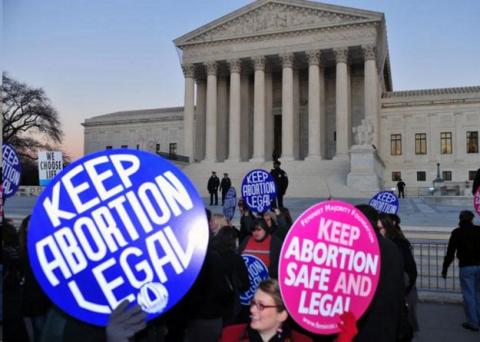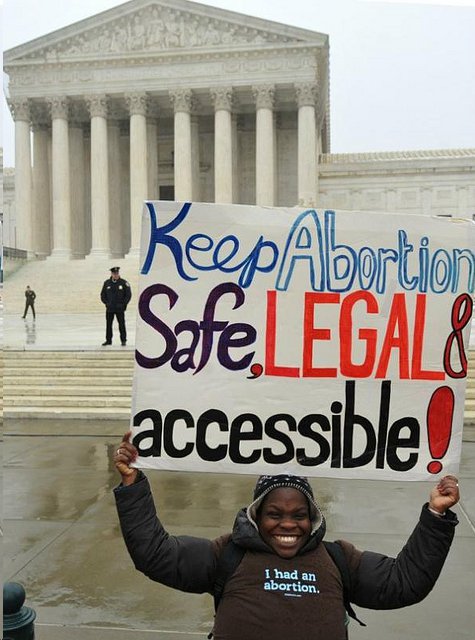Reflecting on ‘Roe v. Wade’ on the Ruling’s 41st Anniversary

From The Root and our content partner New America Media:
Wednesday marked the 41st anniversary of the Supreme Court’s Roe v. Wade ruling that legalized abortion. The decision is rightly credited with saving the lives of thousands of women: According to the Boston Women’s Health Book Collective, prior to Roe,5,000 women died annually from illegal abortions.
So while many women are alive thanks to Roe, a strong argument can be made that in terms of quality of life, the ruling left much to be desired, particularly for black women.
Black women have the highest abortion rates of any group. According to the Guttmacher Institute, abortion rates for black teens ages 15 to 19 are more than twice the national average, while black women as a whole, regardless of age, are four times more likely to have an abortion.
One thing those who oppose abortion rights and those who support them all seem to agree on is that, if nothing else, we should aim for fewer abortions. In that regard, both the pro-choice and pro-life movements have failed black women. I don’t know of a single person who grows up thinking, “I really want to have an abortion someday.” But the numbers make it clear that plenty of black women find themselves in a situation in which they believe that this is either the only choice or the most viable of a number of terrible choices.It doesn’t have to be this way.
Data is clear that when young people have greater access to comprehensive sexual education, their pregnancy rates go down. During the years of President George W. Bush’s abstinence-only sex-education push, teen pregnancy, as well as rates of sexually transmitted diseases, increased. Those states in which abstinence-only education remains the norm continue to struggle with higher-than-average teen pregnancy rates.
As I’ve written previously, “Religious parents are still less likely to discuss comprehensive sexual education than other groups, and African Americans are more likely to identify as religious than other groups. This means that despite studies showing an increase in pregnancy among teens during the years abstinence-only education was the norm—usurping comprehensive sex education—black parents are less likely than other groups to have the tough conversations that are necessary to lead to responsible family planning.”
Further, an Essence magazine survey of 1,500 teens found that "half of African Americans ages 13 to 15 did not discuss sex with their parents." It suggests that there are too many well-meaning black parents out there who are not passing on the education necessary to help their children avoid unplanned pregnancies that might ultimately lead them to consider getting an abortion.

Political conservatives, though, also bear some responsibility for the problem. They not only have been the primary architects of abstinence-only programs but have also been the biggest opponents of making contraception access easy and affordable. One of the Affordable Care Act’s most significant policy legacies is in its requirement that contraception be covered as preventive care, meaning that insurers must cover it with no copay.
Though this seems like a no-brainer (after all, it does prevent something: pregnancy), conservatives have opposed this mandate—on religious grounds—and the dispute between opponents and the Obama administration will soon head all the way to the Supreme Court. In addition, the president has found himself facing off with conservatives over access to Plan B for teen girls. The emergency contraception can be used after intercourse, and immediate access to the drug can be the difference between a teen girl finding herself considering an abortion and not.
The bottom line is that if a woman doesn’t have adequate contraceptive coverage, family planning guidance or access to safe and legal abortion—and, in some cases, access to safety-net assistance programs and Medicaid because they’ve been reduced by budgetary cutbacks—what exactly is she supposed to do?
There’s a disconnect, politically and in terms of policy, when opponents of abortion are also the opponents of greater access to contraceptive care.
In an ideal world, no woman would need to seek an abortion. But we don’t live in an ideal world. Until we do, safe and legal abortion is preferable to seeing thousands of women die from unsafe and illegal abortions, or to seeing more children die from abuse and neglect because they were born to someone who was ill-equipped to care for them.
But an even more ideal solution is for pro-choice and pro-life activists, as well as policymakers, to start treating comprehensive sex education and access to contraception as what they are: America’s most important human rights issues.
Autthor Bio:
Keli Goff is The Root’s special correspondent.






























































































































































































































































































































